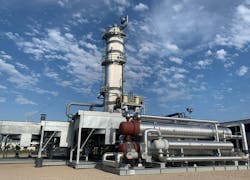Angola’s new Cabinda refinery passes equipment testing phase
Core equipment for the first phase of a grassroots modular refinery under development by the government of Angola’s Sonangol EP and partner Gemcorp Capital LLP has completed necessary testing for approved delivery to and setup at its final destination on the Malembo plain, 30 km north of Cabinda, in the country’s province of Cabinda (OGJ Online, June 4, 2019).
Completed on May 2 at VFuels LLC’s fabrication site in Houston, Tex., factory acceptance testing verified the modular equipment produced and packaged meets functionality and intended objectives for the refinery, clearing the way for its shipment to and assembly at the Cabinda project site, Sonangol said in a May 4 release.
Tested equipment included the newly constructed 30,000-b/d crude oil distillation unit— the largest single-train modular unit of its kind built to date globally—which forms an integral part of the refinery’s $350-million first phase. Alongside a kerosine treating unit, Phase 1 also will feature a desalinator, pipelines, a conventional float anchoring system, and a more than 1.2-million bbl crude oil storage terminal, according to Sonangol and VFuels.
While details regarding a timeline for equipment delivery and assembly at the final construction site were not revealed, Atanas Bostandjev, Gemcorp’s chief executive officer, confirmed the refinery is scheduled for startup sometime this year.
Officially approved in November 2020 at a Phase 1 investment of $220 million, the overall $1-billion Cabinda refinery project will involve future construction of Phases 2 and 3, which will add another 30,000 b/d of crude processing capacity, as well as units for catalytic reforming, hydrotreating, and catalytic cracking that will transform the site into a full-conversion refinery (OGJ Online, Nov. 16, 2020).
To be jointly owned by Gemcorp (90%) and Sonangol (10%), the fully completed 60,000-b/d Cabinda refinery—the first private investment of its kind in Angola—aligns with the Angolan government’s main strategic objectives of increasing domestic crude processing capacity to help considerably reduce the country’s dependence on expensive imports of refined products, encouraging increased foreign investment, and creating employment opportunities for Angolans, according to Sebastião Gaspar Martins, Sonangol’s chairman.
“[This is a crucial milestone for Angola’s refining strategy…[w]e are going to use our natural resources to produce refined products on Angolan soil, with Angolan citizens," Martins said.
In addition to creating 1,300 jobs—most of which will be allocated to the population of the province—over the course of its construction, assembly, and operation, Sonangol said the refinery will contribute to considerable foreign exchange savings.
Once fully operable, the Cabinda refinery will produce gasoline, diesel, LPG, fuel oil, Jet A1, and kerosine, according to Sonangol and Gemcorp.
Odebrecht Engenharia e Construção SA is serving as main engineering, procurement, and construction contractor for the project, the Sonangol-Gemcorp partnership said.
About the Author
Robert Brelsford
Downstream Editor
Robert Brelsford joined Oil & Gas Journal in October 2013 as downstream technology editor after 8 years as a crude oil price and news reporter on spot crude transactions at the US Gulf Coast, West Coast, Canadian, and Latin American markets. He holds a BA (2000) in English from Rice University and an MS (2003) in education and social policy from Northwestern University.

